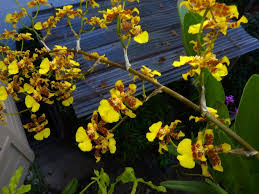# How to Plan a Dancing Lady Orchid Garden

Creating a garden filled with Dancing Lady Orchids, also known as *Oncidium*, can be a rewarding and beautiful endeavor. These orchids are renowned for their unique flower shapes and vibrant colors, making them a stunning addition to any garden. This guide will take you through the essential steps in planning a Dancing Lady Orchid garden, from understanding their requirements to designing and maintaining your garden.
## Table of Contents
1. [Introduction to Dancing Lady Orchids](#introduction-to-dancing-lady-orchids)
2. [Understanding the Requirements of Dancing Lady Orchids](#understanding-the-requirements-of-dancing-lady-orchids)
– 2.1 [Light](#light)
– 2.2 [Temperature and Humidity](#temperature-and-humidity)
– 2.3 [Soil](#soil)
– 2.4 [Watering](#watering)
– 2.5 [Fertilization](#fertilization)
3. [Choosing the Right Location](#choosing-the-right-location)
– 3.1 [Sunlight Exposure](#sunlight-exposure)
– 3.2 [Shelter from Wind and Rain](#shelter-from-wind-and-rain)
– 3.3 [Accessibility](#accessibility)
4. [Designing Your Orchid Garden](#designing-your-orchid-garden)
– 4.1 [Layout Planning](#layout-planning)
– 4.2 [Choosing Companion Plants](#choosing-companion-plants)
– 4.3 [Creating Focal Points](#creating-focal-points)
5. [Planting Dancing Lady Orchids](#planting-dancing-lady-orchids)
– 5.1 [Planting Techniques](#planting-techniques)
– 5.2 [Spacing](#spacing)
6. [Caring for Your Dancing Lady Orchid Garden](#caring-for-your-dancing-lady-orchid-garden)
– 6.1 [Watering Practices](#watering-practices)
– 6.2 [Pest and Disease Management](#pest-and-disease-management)
– 6.3 [Regular Maintenance](#regular-maintenance)
7. [Seasonal Care and Management](#seasonal-care-and-management)
8. [Inspiration and Resources](#inspiration-and-resources)
9. [Conclusion](#conclusion)
—
## 1. Introduction to Dancing Lady Orchids
Dancing Lady Orchids (*Oncidium*) are celebrated for their exquisite blooms, which resemble a graceful dancer in motion. Native to Central and South America, these orchids thrive in diverse environments, from humid rainforests to more temperate climates. They are characterized by their unique flower spikes that can produce numerous blossoms, often in shades of yellow, brown, and orange.
Planning a garden dedicated to these stunning orchids allows you to appreciate their beauty and contribute to their conservation and cultivation. A well-planned orchid garden can serve as a peaceful retreat, a source of inspiration, and a conversation starter.
## 2. Understanding the Requirements of Dancing Lady Orchids
Before you start planning your garden, it’s crucial to understand the specific requirements of Dancing Lady Orchids. These plants have particular needs concerning light, temperature, humidity, soil, watering, and fertilization.
### 2.1 Light
Dancing Lady Orchids thrive in bright, indirect light. Too much direct sunlight can scorch their leaves, while too little light may inhibit flowering. Here are some tips on managing light exposure:
– **Indoors**: Place your orchids near a bright window with filtered light or use sheer curtains to diffuse direct sunlight.
– **Outdoors**: If planting in a garden, choose a spot that receives morning sun and afternoon shade, such as under taller plants or trees.
### 2.2 Temperature and Humidity
Temperature and humidity play a critical role in the health of Dancing Lady Orchids:
– **Temperature**: They prefer daytime temperatures between 75°F and 85°F (24°C to 29°C) and nighttime temperatures around 60°F to 70°F (15°C to 21°C).
– **Humidity**: Maintaining humidity levels of 50% to 70% is ideal. If your environment is dry, consider using a humidifier or placing a tray of water with pebbles near the orchids.
### 2.3 Soil
Dancing Lady Orchids require well-draining potting media. Traditional potting soil is not suitable, as it retains too much moisture. Instead, consider using:
– **Orchid Bark Mix**: A blend of bark, perlite, and charcoal is ideal for good drainage.
– **Sphagnum Moss**: Can be used as a base for moisture retention without becoming waterlogged.
### 2.4 Watering
Proper watering is crucial for the health of Dancing Lady Orchids:
– **Frequency**: Water when the top inch of the potting medium feels dry. This could be once a week or every few days, depending on your climate.
– **Method**: Water thoroughly until water drains from the bottom of the pot, ensuring the roots receive adequate moisture.
### 2.5 Fertilization
Feeding your orchids with the right nutrients is essential for blooming:
– **Fertilizer Type**: Use a balanced orchid fertilizer (e.g., 30-10-10) diluted to half strength.
– **Frequency**: Fertilize every two to four weeks during the growing season (spring and summer) and reduce feeding during the fall and winter.
## 3. Choosing the Right Location
Selecting the right location for your Dancing Lady Orchid garden is vital to their success. Consider the following factors:
### 3.1 Sunlight Exposure
Ensure that the chosen location provides the right amount of sunlight:
– **East-Facing Locations**: Ideal for receiving morning light while being shaded from harsh afternoon sun.
– **Filtered Light Options**: Consider planting near taller plants or structures that can provide dappled sunlight.
### 3.2 Shelter from Wind and Rain
Orchids can be sensitive to harsh weather conditions:
– **Wind Protection**: Choose a location that offers some windbreak, such as near a fence or wall.
– **Rain Protection**: If possible, plant under trees or structures to protect from heavy rain, which can lead to root rot.
### 3.3 Accessibility
Ensure that your orchid garden is easily accessible for maintenance and enjoyment:
– **Paths and Walkways**: Create clear paths to allow for easy movement within the garden.
– **Visibility**: Choose a location that can be appreciated from various viewpoints in your yard or home.
## 4. Designing Your Orchid Garden
A well-designed garden enhances the natural beauty of your Dancing Lady Orchids. Here are some key aspects to consider:
### 4.1 Layout Planning
Start by sketching out a layout for your garden:
– **Garden Size**: Determine how much space you want to dedicate to your orchids and companion plants.
– **Flower Beds**: Consider raised beds or borders to create defined areas for planting.
– **Paths**: Designate areas for walking paths to provide access to all parts of the garden.
### 4.2 Choosing Companion Plants
Incorporating companion plants can enhance the overall appearance and health of your orchid garden:
– **Foliage Plants**: Use ferns or hostas to provide a lush backdrop for your orchids.
– **Colorful Blooms**: Consider planting annuals or perennials that bloom in complementary colors, such as marigolds or petunias.
### 4.3 Creating Focal Points
Establish focal points to draw attention and create interest:
– **Grouping Orchids**: Cluster orchids in groups for a striking display.
– **Decorative Features**: Incorporate elements such as garden sculptures, birdbaths, or benches to enhance the visual appeal.
## 5. Planting Dancing Lady Orchids
Once your garden design is finalized, it’s time to plant your Dancing Lady Orchids. Follow these guidelines for a successful planting process:
### 5.1 Planting Techniques
– **Potting**: If planting in containers, select pots with drainage holes and fill with orchid bark mix.
– **Transplanting**: When transferring orchids from pots to the garden, ensure the roots are not compacted and position them at the same depth as they were in the pot.
### 5.2 Spacing
Proper spacing is crucial for air circulation and growth:
– **Spacing Guidelines**: Space orchids at least 12 to 18 inches apart to allow for their growth and ensure good air circulation.
– **Groupings**: Consider planting in groups of three to five for a more natural look.
## 6. Caring for Your Dancing Lady Orchid Garden
Ongoing care is essential to ensure your Dancing Lady Orchids thrive in your garden:
### 6.1 Watering Practices
Maintain consistent watering practices:
– **Regular Checks**: Monitor the moisture level in the soil and adjust your watering schedule accordingly.
– **Avoid Overwatering**: Be cautious not to let the roots sit in standing water, as this can lead to rot.
### 6.2 Pest and Disease Management
Be proactive in preventing pests and diseases:
– **Regular Inspections**: Check for signs of pests such as aphids or mealybugs, and address any issues promptly.
– **Fungicide Use**: If you notice fungal infections, treat your orchids with an appropriate fungicide.
### 6.3 Regular Maintenance
Keep your garden tidy and healthy:
– **Weeding**: Regularly remove weeds that compete for nutrients and water.
– **Pruning**: Trim back any dead or yellowing leaves to promote healthy growth.
## 7. Seasonal Care and Management
As seasons change
, your care routine may need to adapt:
– **Spring**: Begin fertilizing as new growth appears and ensure adequate watering.
– **Summer**: Monitor for heat stress and adjust watering as necessary.
– **Fall**: Reduce feeding as the growing season winds down.
– **Winter**: Protect orchids from cold drafts and maintain humidity levels indoors.
## 8. Inspiration and Resources
For those looking to deepen their knowledge or find inspiration for their Dancing Lady Orchid garden, consider these resources:
– **Books**: Titles such as “Orchid Gardening for Beginners” and “The Complete Guide to Orchids” can provide valuable insights.
– **Online Communities**: Join forums and social media groups focused on orchid cultivation to connect with fellow enthusiasts.
– **Local Botanical Gardens**: Visit local gardens or orchid shows to see different varieties and get ideas for your own garden.
## 9. Conclusion
Creating a Dancing Lady Orchid garden is a fulfilling project that allows you to appreciate the beauty and diversity of these remarkable flowers. By understanding their needs, carefully planning your garden layout, and providing ongoing care, you can cultivate a vibrant space filled with these enchanting orchids.
Embrace the journey of gardening and enjoy the process of nurturing your Dancing Lady Orchids as they bloom and thrive in your care. With patience and dedication, your orchid garden will not only enhance your outdoor space but also bring joy and tranquility to your life.

